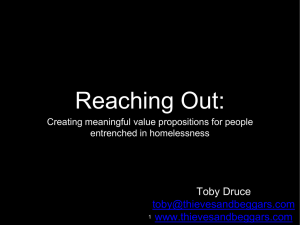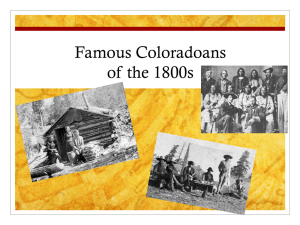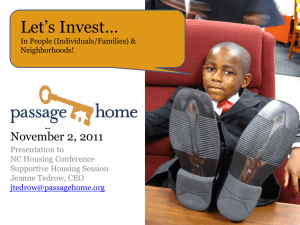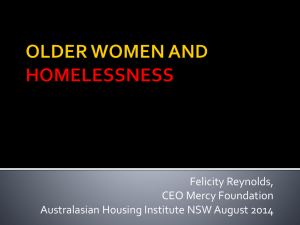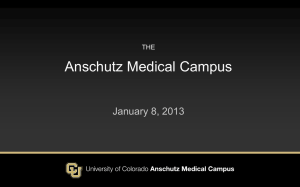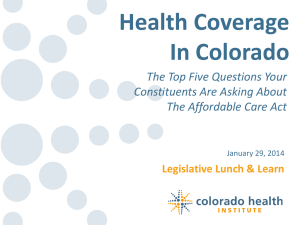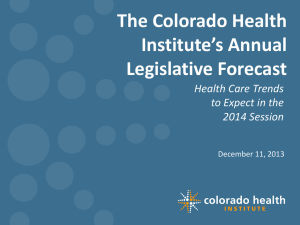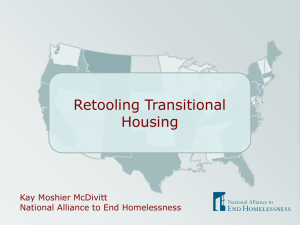The Fort Lyon Supportive Residential Community in Las Animas
advertisement
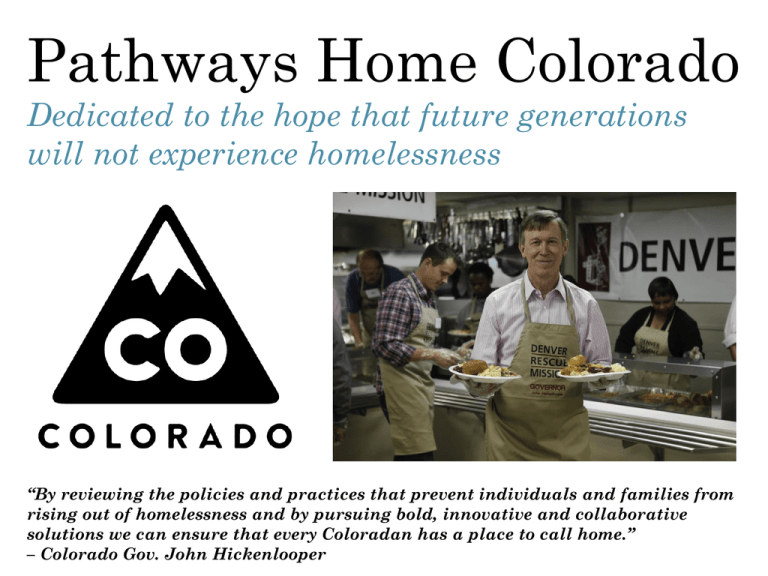
Pathways Home Colorado Dedicated to the hope that future generations will not experience homelessness “By reviewing the policies and practices that prevent individuals and families from rising out of homelessness and by pursuing bold, innovative and collaborative solutions we can ensure that every Coloradan has a place to call home.” – Colorado Gov. John Hickenlooper State Plan Adopted 2013 Collaborative partnerships - Building effective working relationships among housing providers, human service agencies and other community partners generates sustainable solutions. Prioritized resources - Prioritizing available resources helps communities discover efficient and effective ways to provide housing and supportive services. Deploying measurable strategies ensures helps determine what programs are effective. Effective policies - Aligning practices and resources that prevent Coloradoans from rising out of homelessness. The needs of each population are significant, diverse, and specific. Engaged political leadership - In this time of competing concerns and limited resources it is an imperative that we engage local elected officials and community leaders in information sharing, regional capacity building, and best practice replication. Jennifer Lopez Director of Homeless Initiatives Governor John W. Hickenlooper New position in Governor’s Office made possible through a unique public/private partnership • Foundation Funded • Works with state agencies to implement outcomebased policies and programs that prevent and end homelessness in Colorado. • Directs Pathways Home implementation Homelessness in Colorado The 2012 statewide Point-In-Time counted 16,768 homeless households and individuals in Colorado in a given night. 189 Colorado school districts reported 23,293 homeless children and youth in 2013. Key Strategies Increase Permanent Supportive Housing (PSH) Statewide – Change PSH funding process at CHFA and DOH – Increase capacity through Pathways Permanent Supportive Housing Toolkit Process – Complete a Medicaid Crosswalk to increase funding for services – Maintain Fort Lyon Residential Community – Increase state funded vouchers The Fort Lyon Supportive Residential Community in Las Animas, Colorado - Ending veteran homelessness in Colorado. - Reducing chronic homelessness throughout Colorado. - Sustaining an economic driver for Southeastern Colorado. The Fort Lyon community provides recovery oriented transitional housing to individuals who are experiencing homelessness. The 550-acre facility, which previously served as a U.S. Department of Veterans Affairs hospital, sanatorium and prison, provides supportive housing with access to mental health and health care services, substance-abuse treatment and counseling, as well as educational and vocational training. Residence prior to program entry Fort Lyon is a new component of Colorado’s existing continuum of care for a specific, hard to serve, population. Since September 2013, 221 individuals experiencing homelessness, 23% of which are veterans, have enrolled at Fort Lyon. Supportive Housing A more humane solution to ending homelessness for individuals struggling with addiction, mental health and/or other disabilities who lack the social support, resources or ability to sustain and maintain housing without supportive services and subsidized housing. Services Targeted: Based on populations served Flexible: Responsive to residents’ needs Voluntary: Participation is not a condition of residency Fort Lyon Finances - FY13-14: $2.78M of General Fund for capacity to serve 200 residents. - FY14-15: $3.22M of General Fund for the capacity to serve 300 residents. - Supplemented state funds with $5M Attorney General settlement dollars from the "big five" banks. Fort Lyon Education & Job Training Time Frame December 31 2013 September 1 2014 Target Outcome Actual 60% receive ▪ 61 clients (87%) enrolled in preeducational/vocational employment modules training annually ▪ 14 clients (20%) enrolled in classes at Otero Junior College (OJC) ▪ OJC has donated 20 laptops for the computer lab ▪ OJC will begin teaching 4 classes on-site January 27, 2014 (two English classes, Computer Basics, and Health Navigator) Provide 5 on-site job 3 job training programs established: training programs food service, grounds keeping, and facilities maintenance Program participants fully engage in the overall operations of the campus including food services, facilities maintenance, grounds maintenance, housekeeping and waste water management—in conjunction with their daily participation in group and individual counseling. Otero Junior College and Lamar Community College provide customized educational and vocational training in computer technology, construction industries, health services, agricultural sciences and more. Fort Lyon: Lessons Learned • Statewide coalition critical for political support • Re-integration planning key. • As in PSH models residents leave when they are ready. • Onsite Fed Qualified Health Clinic helps with access to services and funding
